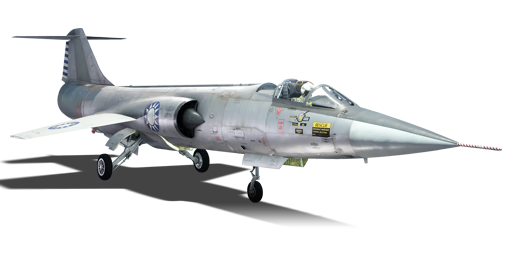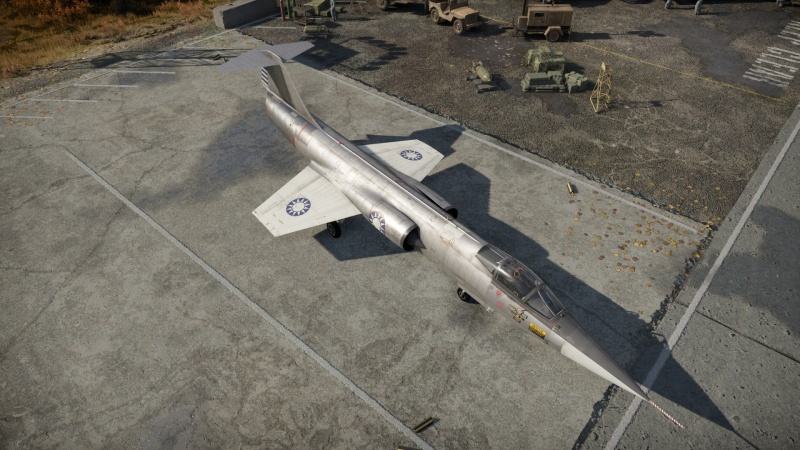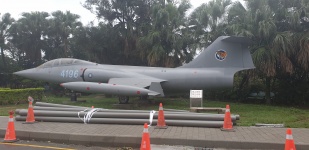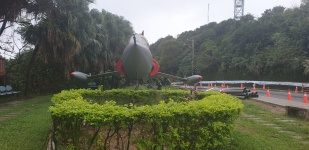Difference between revisions of "F-104G (China)"
(→Armaments: Added ballistic computer table) |
(→Suspended armament: Updated) |
||
| Line 151: | Line 151: | ||
* Without load | * Without load | ||
| + | * 2 x AIM-9B Sidewinder missiles | ||
* 14 x Hydra-70 M247 rockets | * 14 x Hydra-70 M247 rockets | ||
* 2 x AGM-12B Bullpup missiles | * 2 x AGM-12B Bullpup missiles | ||
Revision as of 09:41, 4 June 2021
| This page is about the jet fighter F-104G (China). For other versions, see F-104 (Family). |
Contents
Description
The ␗F-104G Starfighter is a rank Chinese jet fighter with a battle rating of (AB), (RB), and (SB). It was introduced in Update "Starfighters".
The F-104 Starfighter had a long career with the Republic of China Air Force. The multi-role F-104G model, originally developed for export to Germany, is a major leap compared to the previous ROCAF F-104A and enjoys a more powerful engine and much better suspended ordnance. This Taiwanese example differs from the original F-104G by having access to the AIM-9J Sidewinder air-to-air missile and the AGM-12B Bullpup air-to-ground missile, making it one of the most formidable Starfighters in War Thunder and an impressive aircraft to cap off the ROCAF fighter line.
General info
Flight performance
The F-104G has about 8% more engine thrust than the F-104A in exchange for slightly increased weight. The general performance has been improved but the characteristics remain similar, so anyone used to flying the F-104A will find the transition easy. As with the other Starfighters, the F-104G has great speed, acceleration, and climb rate due to its streamlined aerodynamics and powerful engine. This is achieved at the cost of low-speed handling and turning capabilities. It only turns acceptably at transonic or supersonic speeds, anything below that being far below average for a jet fighter. The stubby wings with a low aspect ratio also contribute to poor maneuvering energy retention, so extended turning will bleed energy quickly. The roll rate is good, which helps in defensive maneuvers.
| Characteristics | Max Speed (km/h at 15,240 m) |
Max altitude (metres) |
Turn time (seconds) |
Rate of climb (metres/second) |
Take-off run (metres) | |||
|---|---|---|---|---|---|---|---|---|
| AB | RB | AB | RB | AB | RB | |||
| Stock | 2,343 | 2,317 | rowspan="2" | 34.5 | 35.1 | 230.5 | 222.5 | 850 |
| Upgraded | 2,431 | 2,387 | 33.5 | 34.0 | 292.0 | 260.0 | ||
Details
| Features | |||||
|---|---|---|---|---|---|
| Combat flaps | Take-off flaps | Landing flaps | Air brakes | Arrestor gear | Drogue chute |
| X | ✓ | ✓ | ✓ | ✓ | ✓ |
| Limits | ||||||
|---|---|---|---|---|---|---|
| Wings (km/h) | Gear (km/h) | Flaps (km/h) | Max Static G | |||
| Combat | Take-off | Landing | + | - | ||
| N/A | 827 | 444 | ~12 | ~5 | ||
| Optimal velocities (km/h) | |||
|---|---|---|---|
| Ailerons | Rudder | Elevators | Radiator |
| < 720 | < 950 | < 800 | N/A |
Engine performance
| Engine | Aircraft mass | ||||||
|---|---|---|---|---|---|---|---|
| Engine name | Number | Basic Mass | Wing loading (full fuel) | ||||
| General Electric J79-GE-11 | 1 | 6,552 kg | 532 kg/m2 | ||||
| Engine characteristics | Mass with fuel (no weapons load) | Max Takeoff Weight | |||||
| Weight (each) | Type | 10m fuel | 20m fuel | 30m fuel | 33m fuel | ||
| 1,615 kg | Afterburning axial-flow turbojet | 7,353 kg | 8,153 kg | 8,954 kg | 9,194 kg | 24,000 kg | |
| Maximum engine thrust @ 0 m (RB / SB) | Thrust to weight ratio @ 0 m (WEP) | ||||||
| Condition | 100% | WEP | 10m fuel | 20m fuel | 30m fuel | 33m fuel | MTOW |
| Stationary | 4,128 kgf | 6,357 kgf | 0.86 | 0.78 | 0.71 | 0.69 | 0.26 |
| Optimal | 4,128 kgf (0 km/h) |
8,391 kgf (1,200 km/h) |
1.14 | 1.03 | 0.94 | 0.91 | 0.35 |
Survivability and armour
The F-104G is not equipped with any armour plating, and is therefore rather vulnerable to enemy fire, especially given the fact that most enemies at this rank sport high-calibre cannons. Since the plane's wings are so small, any damage to them at all drastically reduces stability and manoeuvrability, and may result in a crash. All of the vehicle's fuel tanks are centrally located, so fuel fires are unlikely to occur. However, the engine is very large, so it is very likely that it will sustain heavy damage if the vehicle is fired upon.
Modifications and economy
Armaments
| Ballistic Computer | |||
|---|---|---|---|
| CCIP (Guns) | CCIP (Rockets) | CCIP (Bombs) | CCRP (Bombs) |
| |
|
|
|
Offensive armament
The F-104G (China) is armed with:
- 1 x 20 mm M61A1 cannon, -mounted (750 rpg)
The M61 Vulcan is a powerful gatling cannon. A quick and accurate burst can send targets into flames and the incredible rate of fire allows for some spray-and-pray, which is especially helpful considering how difficult it can be to get guns on target in this aircraft. But it has several drawbacks: first, the gun needs to spool up momentarily before it will fire, and second, the ammunition supply of 750 rounds will be depleted in no time if fired continuously. The former makes tap firing the gun to conserve ammunition a difficult affair but the latter means that holding down the trigger is not optimal either—certainly an awkward situation! New pilots can be afford to be somewhat more trigger-happy as they get used to the gun.
Suspended armament
The F-104G (China) can be outfitted with the following ordnance:
- Without load
- 2 x AIM-9B Sidewinder missiles
- 14 x Hydra-70 M247 rockets
- 2 x AGM-12B Bullpup missiles
- 4 x AIM-9B Sidewinder missiles
- 4 x AIM-9J Sidewinder missiles
- 2 x AIM-9B Sidewinder missiles + 14 x Hydra-70 M247 rockets
- 2 x AIM-9J Sidewinder missiles + 14 x Hydra-70 M247 rockets
- 2 x AGM-12B Bullpup missiles + 2 x AIM-9B Sidewinder missiles
- 2 x AGM-12B Bullpup missiles + 2 x AIM-9J Sidewinder missiles
- 3 x 500 lb LDGP Mk 82 bombs (1,500 lb total)
- 3 x 750 lb M117 cone 45 bombs (2,250 lb total)
- 3 x 1,000 lb LDGP Mk 83 bombs (3,000 lb total)
- 1 x 500 lb LDGP Mk 82 bomb + 2 x AIM-9B Sidewinder missiles (500 lb total)
- 1 x 750 lb M117 cone 45 bomb + 2 x AIM-9B Sidewinder missiles (750 lb total)
- 1 x 1,000 lb LDGP Mk 83 bomb + 2 x AIM-9B Sidewinder missiles (1,000 lb total)
- 1 x 500 lb LDGP Mk 82 bomb + 2 x AIM-9J Sidewinder missiles (500 lb total)
- 1 x 750 lb M117 cone 45 bomb + 2 x AIM-9J Sidewinder missiles (750 lb total)
- 1 x 1,000 lb LDGP Mk 83 bomb + 2 x AIM-9J Sidewinder missiles (1,000 lb total)
As a fighter bomber variant of the F-104, the F-104G has vastly improved ordnance compared to the F-104A's measly pair of AIM-9Bs. For air-to-air combat, the best loadout consists of four AIM-9J Sidewinder missiles. The AIM-9Js have good range, target acquisition, and maneuverability. They can be fired from a fairly safe distance and score kills reliably, which is definitely helpful since the F-104G does not fare well in close-quarters dogfights.
For ground attack, the F-104G can carry bombs, rockets, and missiles. The largest bombload consists of three 1000 lb bombs. The only rockets it has access to are Hydra-70s with decent penetration but low explosive mass and ammo count. The real stars of the show for tank busting are the pair of AGM-12B Bullpup air-to-ground missiles. These have a warhead twice as large as the AS-20 Nords carried by the German F-104G and require less precision to score a kill. However they fly significantly slower, which can either be a good or bad quality depending on one's skill with manual guidance. Two AIM-9J Sidewinders can be carried in addition to the Bullups to round out the loadout.
Usage in battles
The F-104G does one thing extremely well: speed. This is the vehicle's greatest advantage, and can be used to great effect if the pilot is careful about choosing which engagements to pursue. It is recommended to keep up a high air-speed at all times, which will allow the F-104G to swoop in and out of the combat zone while evading enemies. Stick to boom-and-zoom attacks and avoid charging directly into combat. Keep a safe distance from enemy fighters, as it is easy for enemies to make the F-104G overshoot or otherwise reverse it. If an enemy gets on the F-104G's tail, there is not much one can do besides accelerating away or in emergencies using the roll rate to dodge fire and enter rolling scissors. If a safe distance is maintained, it is even possible to outrun enemy air-to-air missiles.
The F-104G struggles with manoeuvrability. With such small wings, it simply can't produce the lift necessary to throw itself around the sky, and therefore has a very poor turning circle. This means that any turning engagement is most likely futile, and also reemphasizes the utility of a boom and zoom playstyle. Note that the use of flaps can significantly improve turning performance, even at high speeds, but any situation requiring hard turning is in all likelihood unfavorable to the F-104G to begin with.
This vehicle is equipped with AIM-9J air-to-air missiles, which are some of the best in the game. With the ability to mount four of them, this vehicle has the potential to do great damage to enemy targets. The F-104G can also equip a wide variety of bombs and rockets, which allows it to fulfill a ground-attack role. It is inferior to the F-104S in total bombload and rocket selection and is still oriented towards air superiority overall. In combined battles, the Bullpup AGMs are effective for destroying tanks. But a few factors dampen the F-104G's utility here: its poor handling and high speed give only a small window of time to manually guide the Bullups, it does not perform well in hectic low-altitude dogfights, and as of Update "Hot Tracks", the only Chinese ground vehicle that matches its battle rating is the ZTZ99. Tankers using the 9.7 lineup with the ZTZ96A who wish to bring in Bullups for close air support will be better served by the F-100A.
Radars
The F-104G is equipped with a PS-03 search and tracking radar. The radar is mounted in the nose of the aircraft.
| PS-03 - Target Detection Radar | |||
|---|---|---|---|
| Maximum Detection Range |
Guaranteed Detection Range |
Max Azimuth Scan Angle |
Max Elevation Scan Angle |
| 90,000 m (theoretical) |
30,000 m | ±60.0° | -30.0°/+60.0° |
| PS-03 - Target Tracking Radar | |||
| Maximum Tracking Range |
Minimum Tracking Range |
Azimuth Tracking Angle |
Elevation Tracking Angle |
| 75,000 m | 200 m | ±60.0° | -30.0°/+60.0° |
Pros and cons
Pros:
- Very high speed compared to its peers
- Highly effective air-to-air missiles
- Above-average rate of climb
- AGM-12B Bullpups pack a punch against ground targets
- Good roll rate
Cons:
- Very poor manoeuvrability at low speeds
- Bleeds speed in turns
- No flares, hard to evade missiles
History
The Lockheed F-104 Starfighter was a supersonic jet fighter known for its distinctive appearance, described as a "missile with a man in it". At the time of its introduction in 1958 with the US Air Force as an interceptor, the F-104 set multiple performance records and was the first production fighter capable of flying at twice the speed of sound. Flaws of the design included engine troubles, limited range, and poor handling characteristics that led to a poor safety record, earning it several morbid nicknames like "Widowmaker".
The F-104's involvement with the Republic of China/Taiwan began soon after it entered service with the US Air Force in 1958. The Second Taiwan Straits Crisis in the August of that year was sparked by the People's Liberation Army shelling new ROC military installations on the islands of Kinmen and the Matsu Archipelago. The USAF deployed F-104s to Taiwan and used them to perform supersonic passes into the airspace of the Straits and mainland China in order to show off the capabilities of the Mach-2 capable Starfighter and intimidate the PLAAF, which at that time was equipped with MiG-15s and MiG-17s. No actual shooting engagements occurred and the F-104s were withdrawn after a cease fire in October.
The Republic of China Air Force received its first Starfighters starting in 1960, the first batch of F-104A/Bs being from ex-USAF stock. Over the decades, subsequent batches were obtained from a wide variety of countries. The F-104G was obtained from the United States in 1964-69, from Germany in 1983, and from Denmark in 1987, totalling 99 single seaters. More than half of the total Starfighter inventory of the ROCAF consisted of the F-104G, making it the most numerically important model and also the most advanced, along with the F-104Js they had received from Japan.
In operational service, the Starfighters were used to patrol the Straits and was the ROCAF's most capable interceptor for much of the Cold War era. ROCAF F-104Gs engaged PLAAF J-6s in the airspace of Kinmen in January 1967 and reportedly scored two kills, though one F-104 did not return to base and may have been lost. Their service was otherwise uneventful. The early Starfighter models were retired from combat roles in the 1980s and the late models continued to serve up to 1997 with upgrades to their weaponry.
A large number of Starfighters are preserved and on display in Taiwan today. Single-seat F-104Gs can be found at Ching Chuang Kang Air Base, Kangshan Chinese Air Force Museum, Pingtung Air Base, and other locations. A full list can be found here.
Media
- Images
See also
Links to the articles on the War Thunder Wiki that you think will be useful for the reader, for example:
- reference to the series of the aircraft;
- links to approximate analogues of other nations and research trees.
External links
Paste links to sources and external resources, such as:
- topic on the official game forum;
- encyclopedia page on the aircraft;
- other literature.
| Lockheed Corporation | |
|---|---|
| Fighters | XP-38G · P-38E · P-38G-1 · P-38J-15 · Bong's P-38J-15 · P-38K · P-38L-5-LO · YP-38 |
| Bombers | B-34 · PV-2D |
| Jet Fighters | F-80A-5 · F-80C-10 |
| F-104A · F-104C | |
| Strike Aircraft | F-117 |
| Export / License | A-29 · ▄Hudson Mk V |
| ␗P-38L-1 | |
| ␗F-104A · ▀F-104G · ␗F-104G · ▄F-104G · ▅F-104J · ▄F-104S | |
| The Lockheed Corporation merged with Martin Marietta Corporation in 1995 to form Lockheed Martin Corporation. | |
| See Also | SABCA · Mitsubishi Heavy Industries · Fiat Aviation |
| China jet aircraft | |
|---|---|
| Fighters | J-2 · J-4 · J-6A · J-7II · J-7D · J-7E · J-8B · J-8F · J-10A · J-11 · J-11A |
| Strike aircraft | Q-5 early · Q-5A · Q-5L · JH-7A |
| Bombers | H-5 |
| France | ␗Mirage 2000-5Ei |
| USA | ␗F-84G-21-RE · ␗F-84G-31-RE · ␗F-86F-30 · ␗F-86F-40 · ␗F-100A · ␗F-100F · ␗F-104A · ␗F-104G · ␗F-5A · ␗F-5E · ␗F-16A MLU |
| USSR | ␗MiG-9 · ␗MiG-9 (l) |
| North Korea | Shenyang F-5 |
| Pakistan | A-5C · JF-17 |







